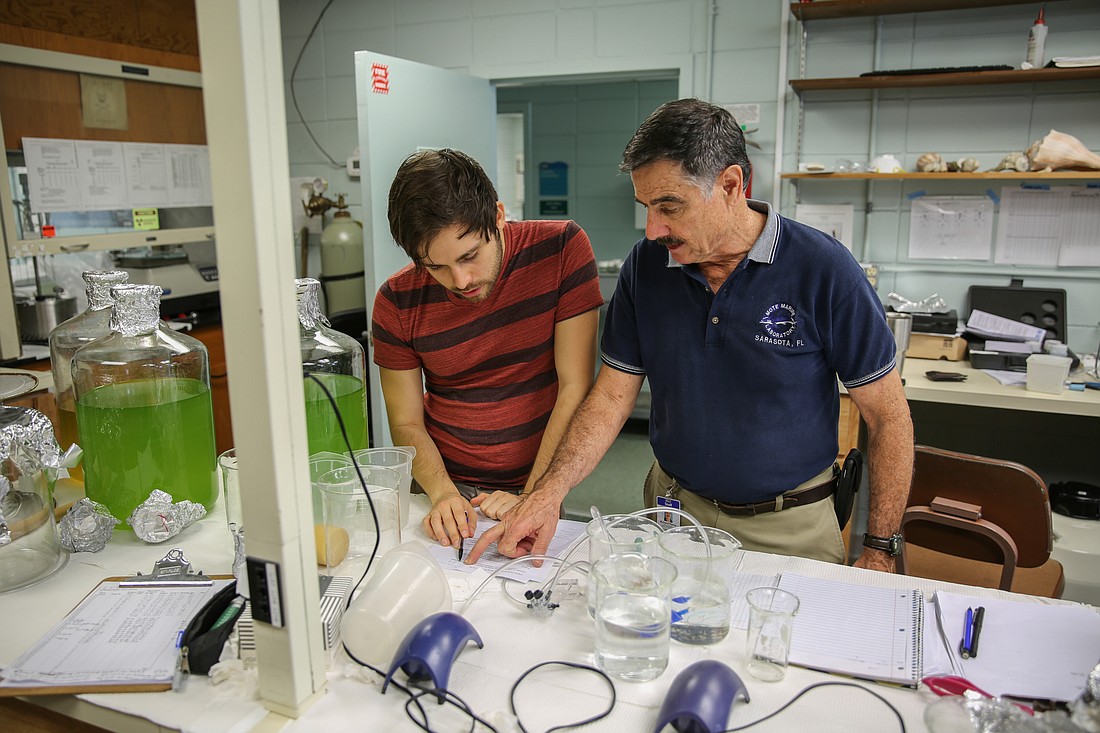- July 4, 2025
-
-
Loading

Loading

Mote Marine Laboratory is taking a step forward in addressing red tide.
A philanthropic investment of $1 million from The Andrew and Judith Economos Charitable Foundation will establish and support the first year of operations of the Red Tide Institute at Mote Marine Laboratory, a statement from Mote said.
The institute will be a center of research and development, which will be focused solely on advancing technologies for controlling and mitigating red tide impacts. The statement continued by saying that the institute will leverage other red tide-related research by Mote and its partners at Florida Fish and Wildlife Conservation Commission and other organizations.
“The institute is a vision we’ve had for a few years in order to do something different than what’s been done for the last 20 years with research and red tide and other harmful algal blooms,” Crosby said.
Crosby said he was floored when Andrew Economos asked to meet with him regarding red tide.
“We cannot thank The Andrew and Judith Economos Charitable Foundation enough for providing this critical bedrock for an intensive, science-based initiative focused on developing and testing red tide mitigation technologies,” Mote President and CEO Michael Crosby said. “The momentum created by establishing the Red Tide Institute at Mote will hopefully inspire other visionary, philanthropic leaders to join an effort that must continue long after this year’s bloom is out of sight and out of mind for many.”
Andrew Economos said philanthropy should be a main effort in combating red tide, and he and Judith Economos are looking at their donation as a start.
“We’ve always been interested in the sciences, but we also are very interested in this particular problem, and we wanted to start something that had a goal of mitigating, if not destroying the problem,” Andrew Economos said.
In September, the state of Florida directed $2.2 million to advance mitigation science at multiple institutions. This investment included Mote’s mitigation technologies, such as its ozone treatment system that was pilot tested for dead-end canals, and the use of a new clay formula for red tide mitigation, which is a partnership between Mote, Woods Hole Oceanographic Institution, the University of South Florida and FWC, the statement said.
The institute will allow Mote to look research and technology that shows promise and eliminate strategies that don’t show as much promise. Any technologies or strategies will be tested in a laboratory setting first, Crosby said. So far, Mote staff has identified about a dozen different mitigation technologies and tools that will be lab tested to determine if they should move on to the next level of testing, Crosby said in an email.
“You might find something that’s very good in a lab setting that you could never apply in a larger scale, and so all of those things will be factored into the research, and it’s a very applied research program,” Crosby said.
Such things that will be factored are whether or not the technology will improve the quality of life and decrease the impacts, such as reducing the massive fish kills that were seen with the most recent red tide bloom.
Mote staff will continue to test its ozone treatment system in the new institute.
“We don’t expect the ozone treatment to address red tide at large scales,” Crosby said in an email. “We envision it more for limited areas such as canals and small embayments. We think that addressing red tide may require multiple mitigation tools used together or in sequence, for a given bloom, depending on locations, scales and intensity.”
In addition, Mote staff will look at approaches from around the world in how other countries have battled different kinds of harmful algal blooms. While there will be no new building with this institute, there will be technical staff and a world-class expert senior scientist added to the Mote team, Crosby said in an email.
“The Red Tide Institute is really focusing on action, science-based action, Crosby said. “We are going to use the best and brightest minds in harmful algal bloom research. We are going to use science to develop technology, and we can do this. But we’ll be very proactive and and focus on actually having applied science on this research. There is a specific goal and that is to decrease the impacts…”
Before retiring, Economos, who will serve in an advisory role for the new institute, held a career in computing technology for pioneering applications in aerospace, business and broadcasting. He founded the broadcasting software company, RCS, the statement said. Judith Economos is a poet and artist who taught at Princeton.
“As a longtime innovator and supporter of technology and science for public benefit, I know that consistent funding support is essential for scientific advancement to address grand challenges such as Florida red tide,” Economos said in the statement. “As a native of Sarasota, Florida, I also recognize that Mote Marine Laboratory has advanced innovative red tide research for decades and is dedicated to developing mitigation tools that tangibly improve our quality of life. I invite and encourage other community leaders to leverage this unique and important opportunity to support the Red Tide Institute at Mote, knowing that we can do much more together than alone.”